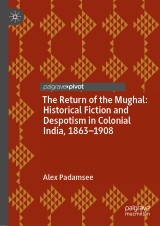Details

The Return of the Mughal: Historical Fiction and Despotism in Colonial India, 1863-1908
|
62,99 € |
|
| Verlag: | Palgrave Pivot |
| Format: | |
| Veröffentl.: | 03.11.2018 |
| ISBN/EAN: | 9781137354945 |
| Sprache: | englisch |
Dieses eBook enthält ein Wasserzeichen.
Beschreibungen
<div>This Pivot explores the uses of the Mughal past in the historical fiction of colonial India. Through detailed reconsiderations of canonical works by Rudyard Kipling, Flora Annie Steel and Romesh Chunder Dutt, the author argues for a more complex and integral understanding of the part played by the Mughal imaginary in colonial and early Indian nationalist projections of sovereignty. Evoking the rich historical and transnational contexts of these literary narratives, the study demonstrates the ways in which, at successive moments of crisis and contestation in the later Raj, the British Indian state continued to be troubled by its early and profound investments in models of despotism first located by colonial administrators in the figure of the Mughal emperor. At the heart of these political fictions lay the issue of territoriality and the founding problem of a British claim to sole proprietorship of Indian land – a form of Orientalist exceptionalism that at once underpinned and could never fully be integrated with the colonial rule of law. Alongside its recovery of a wealth of popular and often overlooked colonial historiography, <i>The Return of the Mughal</i> emphasises the relevance of theories of political theology – from Carl Schmitt and Ernst Kantorowicz to Talal Asad and Giorgio Agamben – to our understanding of the fictional and jurisprudential histories of colonialism. This study aims to show just how closely the pageantry and romance of empire in India connects to its early politics of terror and even today continues to inform the figure of the Mughal in the sectarian politics of Hindu Nationalism.<br></div><div><p></p><br></div>
1. Introduction.- 2. The devil’s sovereignty: plagiarism and political theology in Rudyard Kipling’s <i>The Man Who Would Be King</i>.- 3. Flora Annie Steel and the jurisprudence of emergency.- 4. Time and the nation: Mughals, Maine and modernities in Romesh Chunder Dutt’s historical fiction.- 5. Conclusion.<p></p><p></p>
<p></p><p>Alex Padamsee is Lecturer in Postcolonial Literature at the University of Kent, Canterbury UK. He is the author of <i>Representations of Indian Muslims in British Colonial Discourse </i>(Palgrave Macmillan, 2005) and has published widely on the politics and literatures of colonial and postcolonial South Asia.</p><br><p></p>
<p>Connects the rise of the historical novel about India’s Mughal past to key moments of British imperial consolidation over the Indian territory</p><p>Looks at the literary history of Mughal sovereignty in British and Indian historical fictions of the nineteenth century, and its central role in providing justification for colonial British rule</p><p>Describes the complexities of British engagement with India’s Mughal past, and the different uses it was put to by colonial historians and administrators</p>
Diese Produkte könnten Sie auch interessieren:

Politeness in Shakespeare: Applying Brown and Levinson´s politeness theory to Shakespeare's comedies

von: Abdelaziz Bouchara

43,00 €















